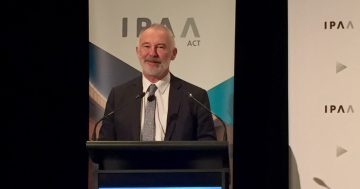
APS Commissioner Gordon de Brouwer wants a no-regrets approach to APS reform. Photo: ANU.
Australian Public Service Commissioner Gordon de Brouwer has told a parliamentary committee that APS reform won’t happen overnight, but it will happen.
Answering criticism that amendments to the Public Service Act didn’t go far enough, Dr de Brouwer said an all-at-once approach wouldn’t work when it came to reforming the sector.
He told the parliamentary inquiry into the amendment bill that reform in the APS had to be incremental for it to be effective – particularly in light of the need to deal with consultancy scandals and the Robodebt fallout.
Introducing reform piecemeal, he suggested, would mean fewer regrets.
“Dealing with everything in one fell swoop, well, that’s tidy, but … you’d have to wait a fair while for other things to fall into place to do everything in one fell swoop”, Dr de Brouwer said.
“Better to do it incrementally … on a no-regrets basis. Each of these things is on a no-regrets basis, and they build on a series of things. They fit the times and they fit the interest of parliament.
“They also go to … the digestibility within public administration. If you change everything within one fell swoop, now, immediately, it’s very hard to absorb.
“If you’ve got a sequence of changes and they evolve and they happen over time, it’s much easier to absorb and actually get deeper institutional change and behaviour.”
The bill seeks to change the APS in several significant ways, including giving secretaries more control over who they employ and giving lower-ranked officers more autonomy in decision-making.
It would also include ‘stewardship’ as a core APS value and boost transparency, including the mandatory publishing of APS Employee Census results.
But the bill has been criticised for not going far enough.
Former public service commissioner Andrew Podger told the committee the amendments did not have the strength to improve the public service to the level it should be.
He recommended the bill be deferred until the government agreed to implement more robust changes.
“If all the provisions in this bill had been in the Public Service Act when the Robodebt scheme was first proposed and managed, there is no reason to believe that they would have in any way constrained what happened,” Professor Podger said.
“A central issue before the committee, therefore, is whether this bill represents the totality of the government’s agenda for legislating change to reform the public service or whether more is to be proposed later.”
More targeted amendments would involve legislating a code of conduct for ministerial advisers, tougher scrutiny of agency heads, including in their selection, and a stronger role for the APS commissioner.
“The problem is that I’m not aware of any commitment by the government to further change,” Professor Podger told the committee.
Greens senator Barbara Pocock appeared to agree with Professor Podger, and told Dr de Brouwer there was “a need for urgency in reforming the APS.
“I think we have seen some really significant collapses of integrity that cause concern,” Senator Pocock said.
“I know they would be causing concern to you and obviously to the government.
“I hope we don’t have to wait too long to address some problems that are very significant for our public sector.”
There are currently 35 APS reform projects in train, but Dr de Brouwer acknowledged the APS Act would have to be amended beyond the current bill if the government accepts all the recommendations of the Royal Commission into the Robodebt Scheme.
“The approach taken to date has been to do the foundational and address the other elements as they arise within the parliament,” he said.


















